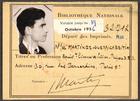 The publishing company Ruedo Ibérico was largely created by one individual: José Martínez Guerricabeitia. José Martínez, called ‘Pepe’ by his friends, was an exceptional man who had a major role in Spanish anti-Francoist cultural and political circles. He was raised in an anarcho-syndicalist environment very close to Valencia, where his father owned a stone quarry. His mother, Josefa Guerricabeitia Orero, was originally from Basque country.
The publishing company Ruedo Ibérico was largely created by one individual: José Martínez Guerricabeitia. José Martínez, called ‘Pepe’ by his friends, was an exceptional man who had a major role in Spanish anti-Francoist cultural and political circles. He was raised in an anarcho-syndicalist environment very close to Valencia, where his father owned a stone quarry. His mother, Josefa Guerricabeitia Orero, was originally from Basque country.
In 1937, at age 16, José Martínez volunteered for the Milicias de Cultura of the Spanish Republican army. Following Franco’s victory, he was taken prisoner of war. Because he was so young, he was not sentenced to a term of imprisonment but was sent to a reform school for two and a half years instead. Afterwards he was drafted into the army. Notwithstanding all the right-wing indoctrination efforts invested in him, he remained faithful to the leftist principles of his upbringing and was active in the underground against Franco in the Valencia region.
The historian Nicolás Sánchez Albornoz remembers meeting José Martínez in 1946, as the publisher-to-be was busy sneaking his underground newspapers (with the ink still wet) into the station in Valencia. He was the intended link between the Federación Universitaria Escolar de Valencia and the central Comité Federal in Madrid. Arrested again, however, he risked receiving a five-year prison sentence. Instead, he fled to Paris in 1948, blending in among the many Spanish exiles already there.
In exile
 Spaniards in exile relied on each other and often met at the popular Café de Cluny or at Soriano’s bookshop at 72, rue de Seine. But the deep political divisions from the Civil War period persisted. Communists, anarcho-syndicalists, socialists, and Trotskyists each set up their own institutions in the French capital. One of the first actions by José Martínez was to launch the journal Peninsula. Only two issues were published, but it was Martínez’s debut in generating publications independently. He was also politically active as the foreign representative of the Federación Universitaria Española (FUE) and the Federaciòn Ibérica de Juventudes Libertarias (FUL).
Spaniards in exile relied on each other and often met at the popular Café de Cluny or at Soriano’s bookshop at 72, rue de Seine. But the deep political divisions from the Civil War period persisted. Communists, anarcho-syndicalists, socialists, and Trotskyists each set up their own institutions in the French capital. One of the first actions by José Martínez was to launch the journal Peninsula. Only two issues were published, but it was Martínez’s debut in generating publications independently. He was also politically active as the foreign representative of the Federación Universitaria Española (FUE) and the Federaciòn Ibérica de Juventudes Libertarias (FUL).
From 1952 until 1958 José Martínez read law and sociology at the VIth section of the École Pratique des Hautes Études, Sorbonne, while at the same time working to make ends meet. At the Sorbonne he attended lectures by the Marxist, Hispanist, and historian Pierre Vilar. His compañera Elena Romo, who corrected copy at the Dictionnaire Larousse, introduced him to people in publishing. Another girlfriend, Marianne Brüll, helped him find work at Hermann publishers, where under the tutelage of Adrian Frutiger he came to appreciate aesthetic aspects of publishing. After working at Hermann for five years, he made a great leap and started his own publishing company.
